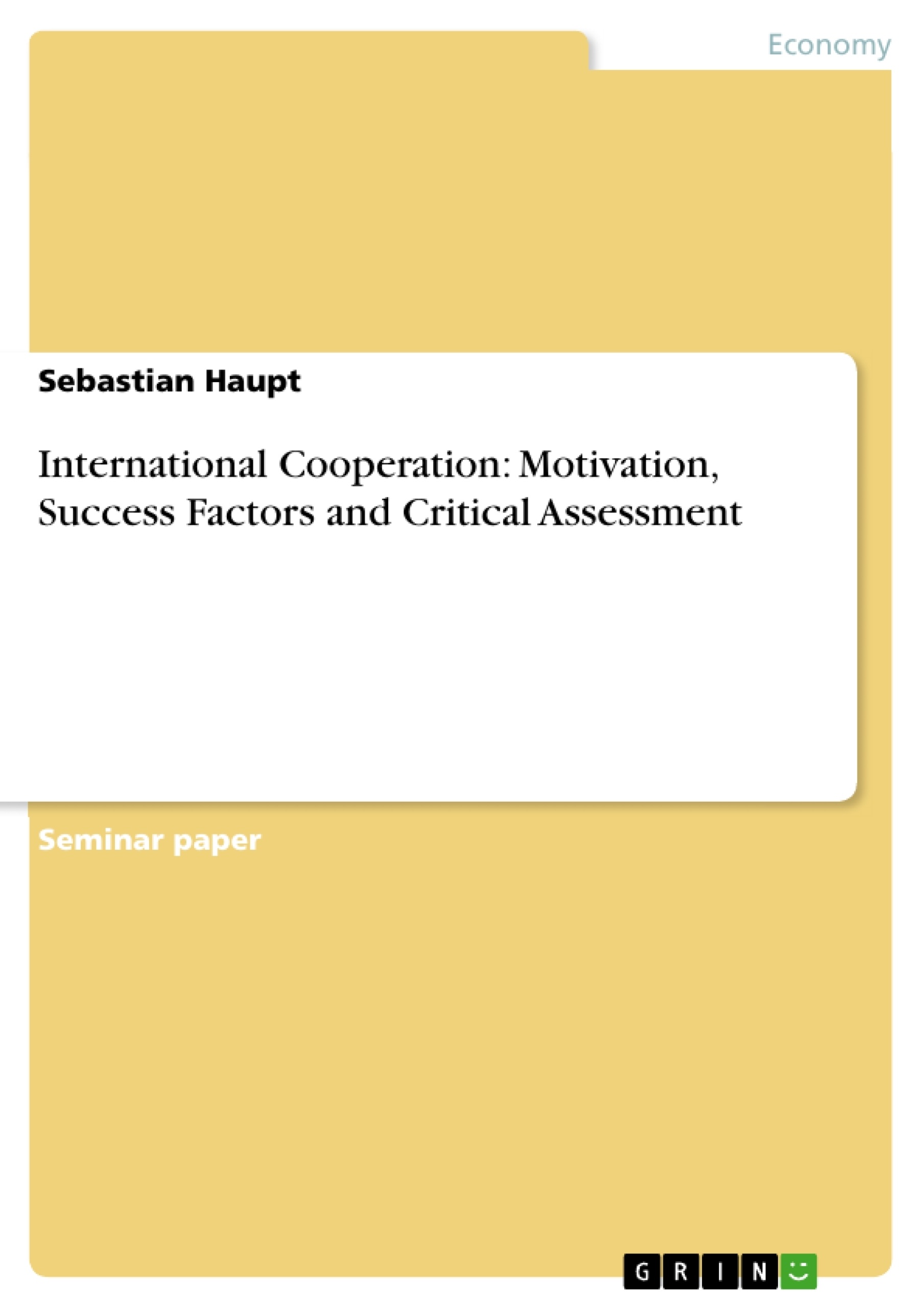The Internationalisation of the markets in the world is past-pacing. Keywords like “Globalisation” and “International Companies” are characterizing this development. For many companies, this growing interconnection of the global economy represents new challenges for the management, primarily evoked by an increasing international competition which is above all characterized by accelerated developments in technology, shorter life cycles of products or lower barriers to market entry. To overcome these complex challenges and to keep up competitive advantages, companies can often not rely on their own potentials anymore. To survive in the international environment many of them are forced to agree on cooperation with other companies. They consider international cooperation as a form of organisation to ensure the access to resources of strategic importance and as a competitive factor on fast changing markets.
This paper will try to substantiate these notions. It is concerned with possible motivations leading companies to international cooperation, as well as with essential success factors. Therefore, the terms “international company” and “international cooperation” will be elucidated and definitions will be given after this introduction. Chapter three analyses the motivations and reasons for cooperation. Subsequent, possible success factors are being discussed according to a phase model of the cooperation process in chapter four. Finally, a critical assessment of cooperation is made by looking at potential risks. The paper closes with a conclusion summarizing the acquired insights.
Table of Contents
- Relevance of cooperation within the international business
- Fundamentals on International Cooperation
- Primal Considerations on International Companies
- Definition and Theory of International Cooperation
- Strategic Alliance and Joint Ventures: Selected Forms of Cooperation
- Motivations and Reasons for International Coope ration
- Basic Reflections on Causes leading to International Cooperation
- Internal Incentives as Motivation for Cooperation
- External Reasons leading to International Cooperation
- Major Success Factors and Requirements for an International Cooperation
- Phase-Oriented Illustration of Crucial Success Factors
- Deciding on Cooperation: The Phase of Initiation
- Essential requirements for selecting a partner: The Phase of Formation
- Successfully Maintaining the Cooperation: The Phase of Realization
- Aspects on Ending a Cooperation: The Phase of Termination
- Control as a cross-stage Success Factor in International Cooperation
- Peril or Opportunity: A Critical Assessment on International Cooperation
- Summarization and Concluding Statement on International Cooperation
Objectives and Key Themes
This paper aims to explore the motivations behind international cooperation, identify key success factors, and critically assess its potential benefits and risks. It seeks to provide a comprehensive overview of the topic, emphasizing the importance of international cooperation in the context of globalization and competitive pressures.
- Defining and understanding international companies and cooperation
- Analyzing the motivations driving companies towards international cooperation
- Identifying and discussing essential success factors for effective international cooperation
- Critically examining potential risks and challenges associated with international cooperation
- Summarizing key insights and offering a concluding statement on the significance of international cooperation.
Chapter Summaries
Chapter 1 introduces the concept of international cooperation in the context of globalization and the increasing interconnectedness of the global economy. The chapter argues that many companies are forced to engage in international cooperation to overcome challenges and maintain competitive advantages.
Chapter 2 focuses on the theoretical foundations of international cooperation. It begins by defining "international company" and its evolution from various perspectives. The chapter then moves on to define the concept of international cooperation, highlighting the lack of a universally accepted definition and discussing its different meanings across disciplines.
Chapter 3 explores the motivations behind international cooperation. It analyzes internal and external incentives that drive companies towards forming partnerships, examining factors such as access to resources, market expansion, and technological advancements.
Chapter 4 examines crucial success factors and requirements for successful international cooperation. It presents a phase-oriented model encompassing the stages of initiation, formation, realization, and termination. The chapter also emphasizes the importance of control as a cross-stage success factor.
Chapter 5 provides a critical assessment of international cooperation, exploring potential risks and challenges associated with partnerships. The chapter examines the potential for conflict, cultural differences, and issues related to communication and control.
Keywords
International cooperation, international company, globalization, motivation, success factors, strategic alliance, joint venture, cross-border activities, competitive advantage, risk assessment, phase model, control, cultural differences, communication.
Frequently Asked Questions
What motivates companies to engage in international cooperation?
Motivations include access to strategic resources, market expansion, technological advancement, and overcoming global competition.
What are the key success factors for a partnership?
The paper identifies factors across four phases: initiation, formation, realization, and termination, with "control" being a cross-stage factor.
What types of cooperation are discussed?
The study focuses on Strategic Alliances and Joint Ventures as selected forms of international business organization.
What are the risks of international cooperation?
Potential risks include cultural differences, communication barriers, conflicts of interest, and lack of effective control.
How does globalization affect international business?
Globalization leads to shorter product life cycles and lower market barriers, forcing companies to rely on external potentials through cooperation.
- Quote paper
- Sebastian Haupt (Author), 2005, International Cooperation: Motivation, Success Factors and Critical Assessment, Munich, GRIN Verlag, https://www.grin.com/document/43338



